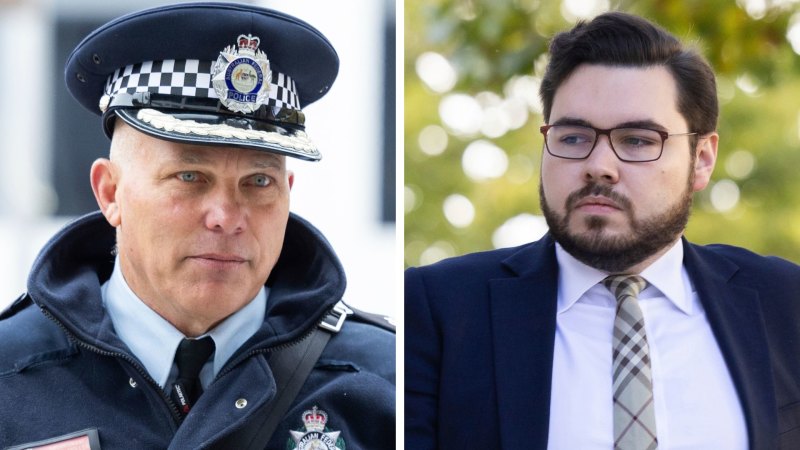Save articles for later
Add articles to your saved list and come back to them any time.
The senior investigator in the Bruce Lehrmann case said the entire team he presided over was worried about hauling the former Coalition staffer before the court because of “the presumption of innocence”.
ACT Policing Detective Superintendent Scott Moller told an inquiry into the abandoned rape trial of Lehrmann that while he was convinced to lay the sexual assault charge, the relationship between police and the prosecutors’ office became fractured because his subordinates didn’t feel the same.
Detective Superintendent Scott Moller said his team had concerns about charging Bruce Lehrmann.Credit: Alex Ellinghausen
“They were concerned for the presumption of innocence,” Moller said. “They were worried about putting Mr Lehrmann before the court when they didn’t think there was enough evidence … that was the principle view that they held.”
The tense relationship between police and the Director of Public Prosecutions, Shane Drumgold SC, has underscored the inquiry into the trial of Lehrmann, who pleaded not guilty to raping his former colleague Brittany Higgins in the parliamentary office of their former boss, Liberal senator Linda Reynolds, on March 23, 2019. Lehrmann has always maintained his innocence.
The trial was aborted due to juror misconduct and a retrial was scrapped because of Higgins’ mental health, but the public fallout between Drumgold and police in the aftermath prompted the ACT government to launch an inquiry into the handling of the high-profile case.
In Tuesday’s hearing, Moller said he found it “offensive” that Drumgold’s lawyer, Mark Tedeschi KC, repeatedly asked him whether he was disappointed the case against Lehrmann progressed, after Moller and his colleagues raised what they believed were significant weaknesses in Higgins’ evidence.
Moller said he was committed to the prosecution once he’d received Drumgold’s advice about the successful prospects of the case.
Tedeschi also raised the theory that officers charged Lehrmann because they perceived political pressure was being exerted on them to act.
In a June 2021 diary note of a meeting with his superior, ACT deputy police chief officer Michael Chew, Moller recorded that his superior said, “if it was my choice I wouldn’t proceed, but it’s not my choice, there is too much political interference”.
But Moller denied that Chew meant he was only pursuing the case because of political pressure. “The collective pressure inside, outside, pressure from DPP, pressure from the media. That’s how I interpreted what he had said to me,” he said.
Early in the inquiry, Drumgold sensationally said he suspected there had been a political conspiracy to derail the prosecution, before qualifying his evidence a day later by saying it was a suspicion he no longer held.
The senior officer also told the inquiry his investigators believed ACT Victims of Crime Commissioner Heidi Yates was blocking Higgins from speaking to police as they built their case.
Moller, who has been highly critical of Yates’ involvement in the case, said his officers were nervous and uncomfortable when interacting with the commissioner in her role as a conduit between detectives and Higgins.
“They felt often that Ms Yates was speaking for Ms Higgins and not allowing Ms Higgins to speak, this was the feedback I was getting from them,” Moller told the inquiry.
Investigators decided in early September 2021 to interview Yates in case Higgins had disclosed anything relevant to her that could be used as evidence in the case, due to their ongoing contact, among other reasons.
Tedeschi asked Moller whether he agreed that by interviewing Yates, “it ran the risk of being viewed by Ms Higgins as an attempt to isolate her” Moller replied, “I didn’t see that.”
Cut through the noise of federal politics with news, views and expert analysis from Jacqueline Maley. Subscribers can sign up to our weekly Inside Politics newsletter here.
Most Viewed in Politics
From our partners
Source: Read Full Article

